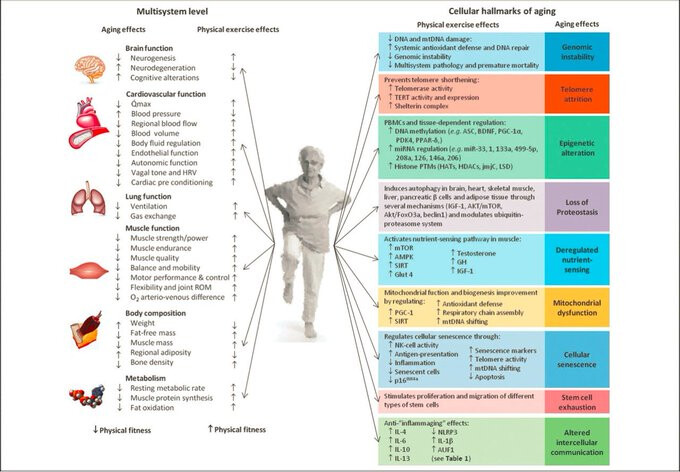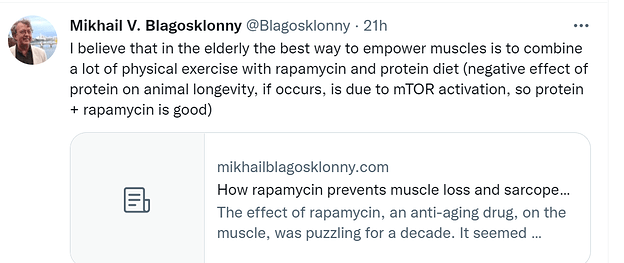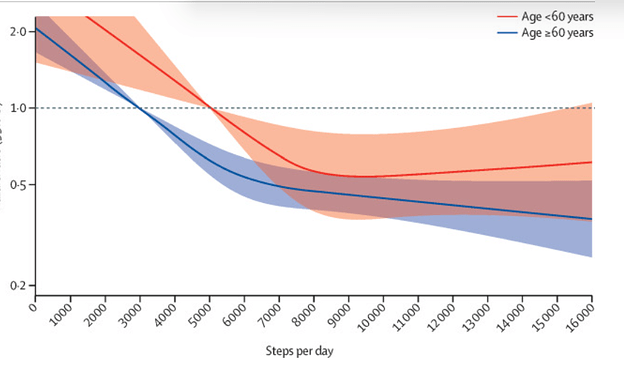Muscle gives you a reserve you need to bounce back from serious illness. My mom is in assisted living, and what happens there a lot is they get the flu (or Covid) and because they have no muscle, after a week in bed they lack the strength to get out of bed. Then they go into a downward spiral they can’t get out of - don’t have the energy to move and eat, which is the only way to gain energy - and eventually they give up, quit eating, and die.
Thanks Dexter, I’m going to go work out now.
Dr. Blagosklonny continues to provide almost daily updates on the wisdom of using rapamycin.
I am always surprised to find that no matter how many times we sift through the maze of various search terms on Google Scholar and PubMed for info about rapamycin, there are always new nuggets to be found that increase our knowledge on the use of rapamycin.
“Chronic activation of mTORC1 stimulates progressive muscle damage and loss.”
“Rapamycin’s effect on aging skeletal muscle, however, was not explored until recently. It has long been known that mTORC1 activity is induced in aging muscle.”
Even taken when we are older it certainly should extend our healthspan if not our lifespan, by preventing frailty and sarcopenia.
It seems like many things we take for granted turn out not to be true.
Today I learned that the “10,000 steps per day” was originally a marketing ploy by a Japanese company to sell pedometers.
I have noticed lately that more studies are turning up J or U-shaped curves when it comes to fitness. More is not always better. Nothing wrong with 10,000 steps, but for people over 60 a little less may be okay
I admit I don’t understand the graph.
It looks to me like young people should stop walking at 10000 steps. Walking more is bad for them since the line goes up.
Old people should keep walking apparently beyond 16000 steps per day. The line continues to go down. Keep walking, your hazard ratio is declining.
Everything below the dotted line is a reduced hazard outcome.
Anything over ~3000 steps for older people is a reduced hazard outcome.
Anyone under 60 needs ~5500 steps to reduce hazard outcomes.
For older people, the difference between 3000 steps and 7000 steps is a lot.
The difference between 7000 steps and 10000 is not so much.
What is notable is how quickly the hazard outcomes rise at less than the number of steps at the crossover points on the dotted line.
I am not suggesting that anyone take fewer steps.
And yet
Cardiorespiratory fitness is inversely associated with long-term mortality with no observed upper limit of benefit. Extremely high aerobic fitness was associated with the greatest survival
Cardio is my number one, strength training two. Oddly, even on days when I don’t feel very welI, I can do cardio and it always makes me feel better.
Decades ago a read an article about the longevity of music conductors and it was concluded that baton and hand waving resulted in upper body fitness.
“A single weekly bout of exercise may reduce cardiovascular mortality: how little pain for cardiac gain?”
I don’t know how this study from 2006 is just now being touted by a fitness guru. I certainly wish that I had seen it sooner. Another study from 2008 backs this up.
“one weekly exercise session was associated with a lower all-cause mortality”
I have been going to the gym 3 or more times a week for decades. This is good news for me because frankly going to the gym so often has become boring and I don’t look forward to it anymore.
“A single weekly bout of exercise may reduce cardiovascular mortality: how little pain for cardiac gain?”
“There was no additional benefit from increasing the duration or the number of exercise sessions per week.”
“Conclusion: These results challenge the current recommendation that expenditure of at least 1000 kcal per week is required to achieve exercise-induced protection against premature cardiovascular mortality.”
I don’t know how this study from 2006 is just now being touted by a fitness guru. I certainly wish that I had seen it sooner. Another study from 2008 backs this up.
“one weekly exercise session was associated with a lower all-cause mortality”
Exercise attenuates the major hallmarks of aging
, Alejandro Lucia2 & colleagues https://ncbi.nlm.nih.gov/pmc/articles/PMC4340807/…

Having washboard abs can actually be bad for you. ![]()
A little abs humor.
Health span vs Life span.
Two very different things.
Quite possible that exercise affects Health span but not Life span.
Have to disagree with you on that one. Most factors that negatively impact health span will almost certainly decrease lifespan. And why would you want one without the other?
Yup, I thought about Jim Fixx when I discovered my Lp(a) level and my genetic risks. Before I knew any of that I thought I was almost bomb proof. Not.
What if the pursuit of optimizing health span and lifespan diverges?
My personal opinion is that optimizing health span is the priority and that will lead to increased life span. Increasing lifespan without a concern for health span is foolish.
In most cases an increase in healthspan will yield an increase in lifespan.
Just watch out for CVD. It doesn’t care how your healthspan is going.
This may not be the most appropriate thread for this. However, for quite a while I’ve been wondering what could be considered ‘optimal’ in terms of hours and types of exercise, when it comes to reducing the decline in immune system / muscle loss with aging / increasing BDNF/maintaining brain health.
(Rodent) studies indicating that overtraining (resulting in higher oxidative damage) can result in insufficient DNA repair, have made me wonder for a few years now.
I love the types of sports I do with a passion, but that also means whenever I have the chance I exercise several+ hours a day. My sport(s) do combine endurance with strength training, stretching/flexibility and some variation on HIT, but I’m still hesitating about the hours and intensity.
Oxidative stress biomarkers responses to physical overtraining: Implications for diagnosis
Interaction between Overtraining and the Interindividual Variability May (Not) Trigger Muscle Oxidative Stress and Cardiomyocyte Apoptosis in Rats
Overreaching-induced oxidative stress, enhanced HSP72 expression, antioxidant and oxidative enzymes downregulation
Excessive eccentric exercise-induced overtraining model leads to endoplasmic reticulum stress in mice skeletal muscles
Etc…
Everyone is different. Why not just use HRV to track recovery? Then you can modulate the stress in terms of: time, frequency and intensity.
Nobody who worries about overtraining is anywhere close to being overtrained.

